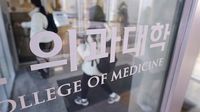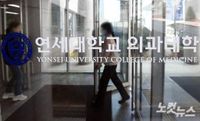The battle over the increase in medical school admissions quotas in South Korea has taken a significant turn as the Seoul Administrative Court dismissed a lawsuit filed by representatives of 33 medical school faculty councils. This development was part of an administrative lawsuit initiated against the government's decision to augment the medical school admission quotas, which had been set to expand by 2,000 students starting from the 2025 academic year.
On March 21, 2025, Judge Kim Joon-young of the Seoul Administrative Court ruled against the professors’ challenge to the Minister of Health and Welfare's announcement regarding the admissions quotas. The court asserted that the announcement is not subject to litigation, deeming that it merely reflects an internal decision-making process of the Ministry and does not hold legal significance that could warrant a court's intervention.
In 2024, the Ministry of Health and Welfare had announced plans to raise the national medical school admissions quota from 3,058 to 5,058. Following this announcement, the Ministry of Education allocated this increased number of spots among various medical schools across the country. However, the increase faced a backlash from the medical education community, particularly from faculty members who claimed they were directly impacted by these changes.
In dismissing the lawsuit, the court found that the Professors Association lacked standing to pursue the case. It noted that their interests as professors are not uniquely protected by law in a way that would allow them to challenge the Ministry of Education's decisions regarding quota allocations. Essentially, the ruling held that because the professors are not the direct counterparts in the Ministry's decisions regarding admissions quotas, they do not possess the requisite qualifications to file the case.
The court's decision marks a significant moment in the ongoing debate around the government’s strategy to increase medical professionals amid growing demands for healthcare services in South Korea. The faculty councils had argued that the decision to increase admissions lacked scientific backing and had not included adequate consultations with the medical community. They maintained that their rights to education were being infringed upon and that the decision contradicted constitutional principles concerning educational governance.
During the hearing, the representatives of the Professors Association claimed that the absence of empirical evidence to support the increase raised questions about the government's decision-making process. They asserted their rights as educators were being undermined; however, these claims were not deemed enough to constitute legal standing by the court.
The government’s move to boost admissions is seen by some as a necessary measure to address future healthcare needs, particularly in response to an aging population that will require increased medical attention. Nonetheless, the decision has sparked concerns over quality education and potential resource strains on existing medical institutions.
This ruling is not the first legal proceedings related to the admissions increase. In June of 2024, previous injunction requests by both professors and other medical personnel were also dismissed as the court found that the requirements for such lawsuits were not met. The cumulative effect of these legal expressions points to an ongoing tension between government intentions to strengthen the healthcare workforce and the concerns raised by medical educators about the implications of such expansions.
In light of the recent developments, those in the medical community continue to discuss the most effective ways to engage with the government to ensure that any future decisions take into account the operational capabilities of educational institutions, as well as the quality of education provided to future medical professionals.
This legal outcome serves to underscore the complexities involved in educational governance and the profound impact that administrative decisions can have on institutional integrity and educational standards. As medical schools brace for upcoming changes in admissions, the dialogue between government officials and educational stakeholders will be essential in shaping the future of medical education in the country.
With the support of various stakeholders, the medical community is expected to pursue more discussions with the government moving forward, aiming for an approach that balances the pressing healthcare needs with the essential requirements for quality medical training.






